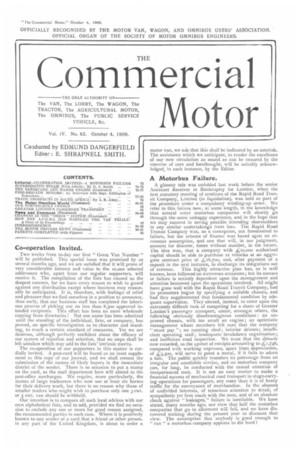Co-operation Invited.
Page 1

If you've noticed an error in this article please click here to report it so we can fix it.
Two weeks from to-day our first "Great Van Number" will be published. This special issue was promised by us several months ago, and we are satisfied that it will prove of very considerable interest and value to the to,000 selected addressees who, apart from our regular supporters, will receive it. The compilation of the lists has caused us the deepest concern, for we have every reason to wish to guard against any distribution except where business may reasonably be anticipated. It is, therefore, with feelings of relief and pleasure that we find ourselves in a position to announce, thus early, that our business staff has completed the laborious process of picking out no less than 8,5oo approved intended recipients. This effort has been no mere wholesale copying from directories! Not one name has been admitted until the standing of the individual, firm, or company, has proved, on specific investigation as to character and standing, to reach a certain standard of resources. Yet we are desirous, although perfectly confident about the efficacy of our system of rejection and selection, that no steps shall be left untaken which may add to the lists' intrinsic merits.
The co-operation of our supporters in this matter is Cordially invited. A post-card will be found as an inset supplement to this copy of our journal, and we shall esteem the submission of the names of likely buyers in the immediate district of the sender. There is so occasion to put a stamp . on the card, as the mail department here will attend to the post-office surcharges. We require, more particularly, the names of large tradesmen who now use at least six horses for their delivery work, hut there is no reason why those of smaller traders who might wish to purchase only one 3 cwt. or 5 cwt. van should be withheld.
Our intention is to compare all such local advices with our own alphabetical lists, and to add, provided we find no occasion to exclude any one or more for good reason assigned, the recommended parties in each case. Where it is positively known to any sender of a card that a friend or other person, in any part of the United Kingdom, is about to order a motor van, we ask that this shall be indicated by an asterisk. The assistance which we anticipate, to render the excellence of our new circulation as sound as can be ensured by the exercise of care and forethought, will be suitably acknowledged, in each instance, by the Editor.
A Motorbus Failure.
A gloomy tale was unfolded last week before the senior Assistant Receiver in Bankruptcy for London, when the first statutory meeting of creditors of the Rapid Road Transit Company, Limited (in liquidation), was neld as part of the procedure under a compulsory winding-up order. We refer to this failure now, at some length, in the knowledge that several other motorbus companies will shortly go through the same unhappy experience, and in the hope that we may succeed in saving possible intending sharenokiers in any similar undertakings from loss. The Rapid Road Transit Company was, as a conception, not foredoomed to failure, but the scheme of finance was based upon an erroneous assumption, and one that will, in our judgment, account for disaster, times without number, in the future. The idea was, that a company with 4fo,000 authorised capital should be able to purchase 22 vehicles at an aggregate contract price of d,..,18,700, and, after payment of a deposit in the tirst instance, to discharge its obligations out of revenue. This highly attractive plan has, as is well known, been followed on numerous occasions; but its success or failure is entirely dependent upon the management and attention bestowed upon the operations involved. All might have gone well with the Rapid Road Transit Company, had its promoters begun by specifying a suitable chassis, and had they supplemented that fundamental condition by adequate supervision. They elected, instead, to enter upon the extremely difficult task of competing for a share of Greater London's passenger transport, under, amongst others, the following obviously disadvantageous conditions : an unproved chassis, with too small an engine; an optimistic management whose members felt sure that the company "must pay "; no running shed; inferior drivers; insufficient operating staff ; inadequate breakdown organisation; and inefficient road inspection. We trust that the dAthicle now recorded, as the upshot of receipts amounting to 4-1,748, compared with working expenses, apart from depreciation, of „{:,3,500, will serve to point a moral, if it fails to adorn a tale. The public quickly transfers its patronage from an irregular and unreliable service, and no motorbus company can, for long, be conducted with the casual attention of inexperienced men. It is not an easy matter to make a financial success of mechanical road transport in stage-carrying operations for passengers, any more than it is of heavy traffic for the conveyance of merchandise. In the absence of undivided interests, of tenacious attention to detail, of sympathetic yet firm touch with the men, and of an absolute check against "leakages," failure is inevitable. We have stated, many months ago, our view that half the motorbus companies that go to allotment will fail, and we have discovered nothing during the present year to discount that view. The assumption that anybody is good enough to "
run" a motorbus company appears to die hard !




















